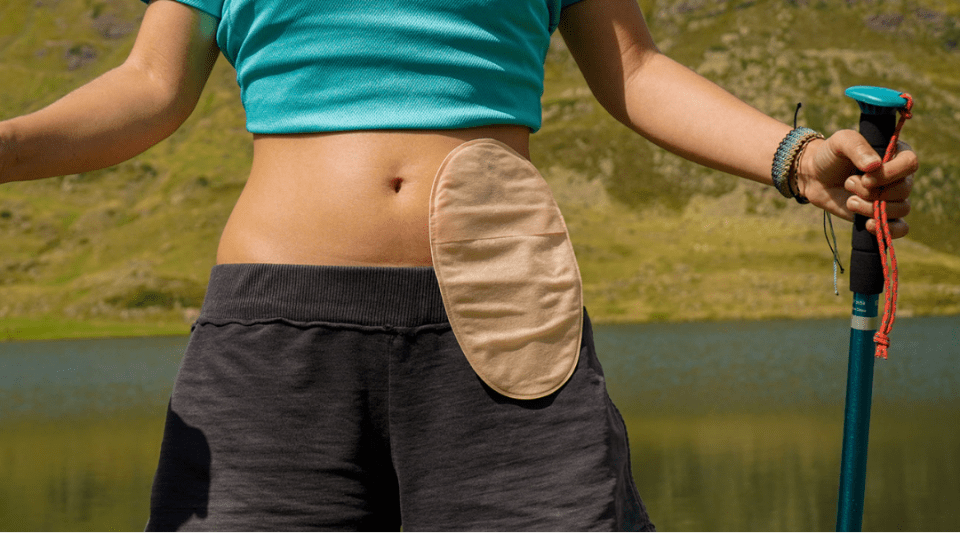It is estimated that 16,000 ostomies are performed every year in Spain. Ostomies or elimination stomas are surgically made holes in the abdomen attached to a conduit from either the digestive or urological system. This allows urine or faeces to be expelled from the body into collection systems, popularly known as pouches. The work of nurses is essential to keep the patient informed and to follow up on the ostomy. It is known that pre- and post-operative health care and education help patients to prepare for the procedure, reduce the stress associated with it and to better accept their new condition. It should be emphasised that these patients can lead a normal lifestyle: they can travel, play sports and be sexually active, for example. The role of the advanced practice nurse in stomatherapy enhances this comprehensive expert care so that patients can look after and manage their ostomy independently.
Stoma care
There are approximately 100,000 people in Spain with an ostomy. There are many types of ostomies depending on where the operation is performed: in the ileum or small intestine (called an ileostomy); in the colon or large intestine (a colostomy); or in the ureters or tubes through which urine passes (urostomy). Faeces or urine are delivered to collection systems or pouches adhered to the skin outside.
The transition from hospital to home can raise questions about the treatment, hygiene, changing the pouch and lifestyle. One of the main things to be remembered is that the stoma has to be cleaned gently with soap and water, without rubbing. Once the skin around the stoma is dry, the new collecting system or pouch can be fitted.
Eating with an ostomy
All kinds of food can be eaten, unless the health professionals advise otherwise. However, it must be remembered that certain foods can cause gas to form (as they can without an ostomy) and affect the consistency or odour of the faeces or urine.
An ostomy, especially an ileostomy, can change how certain foods affect your body. Therefore, you should try them at home first so you can enjoy them later without worrying. You should make sure you chew your food well and stay well hydrated; drinking 6-8 glasses of water a day. Once you know how different foods affect your body, you can choose to moderate or avoid the consumption of certain foods when in public; however, you do not have to cut them out completely.
Although different foods affect everyone differently, some foods frequently produce the following reactions:
- Gas: Asparagus, beer, broccoli, brussels sprouts, cabbage, soda, cauliflower, onions and peas.
- Incomplete digestion: Fruit or vegetable peel, cabbage, celery, coconut, corn, mushrooms, nuts, pineapple, popcorn and seeds.
- Soft stools: Fried foods, grape or plum juice, sugary and spicy foods.
- Foul-smelling faeces: Alcohol, asparagus, broccoli, eggs, fish, garlic, onion and peas.
- Foul-smelling urine: Asparagus, fish, garlic and onions.
Dressing with an ostomy
You can wear whatever you like despite having an ostomy. However, you should bear in mind that some clothes may be more uncomfortable. Whether or not to hide your stoma depends on your personal preference. Most people won't notice if another person has a stoma. In any case, the pouch can be emptied as many times as the person wishes, or requires, to make it less bulky. The nursing team also advise on clothing and accessories to help maintain your lifestyle and help choose the type of pouch that best suits each person's body. There are specialist shops, including online, where you can find clothes and accessories.
Sport or physical activity with an ostomy
Patients with an ostomy can perform sports or physical activity without any problems, although they must wait until their incision is fully healed. However, you should avoid contact sports which can cause injuries or burst the pouches. You can also wear special belts to protect the bag and make them more secure if you run, swim or practise any other activity. If you practise any contact sport or have a job that requires a lot of physical effort, you should talk to the nursing team to find out what accessories may help or what precautions you should take.
Travelling with an ostomy
The ostomy does not have to be any impediment to travel. However, you should always take spare pouches or additional material for hygiene reasons. There are also specific reports and passports translated into multiple languages should you be required to show it at any time.
Continuing your sex life with an ostomy
Once the patients recover from their surgery, they can resume a satisfying sex life. One of the main barriers found is the insecurity the stoma produces for the patient.
You should take the time you need before resuming sexual activity. There are certain precautions that can be taken, such as emptying the bag, ensuring it is closed and tight or using an opaque bag or cover. There are also other accessories and lingerie that help to hold and hide the pouch. There are special devices if you have an urostomy or colostomy. Once you have enough confidence, you should express any fears or insecurities about it with your partner and thus facilitate the process.
The advanced practice stomatherapy nursing team are the people to consult for patients with an ostomy. They educate and inform the patient and family and help during the transition from hospital to home. Following their advice improves patients’ confidence, so they can continue as normal with a good quality of life.
Information documented by:
Ascensión Gómez, Advanced Practice Nurse (APN) in uro-oncology. Hospital Clínic Barcelona.
Rosa Costa, Advanced Practice Nurse (APN) in colorectal cancer and stomatherapy. Hospital Clínic Barcelona.






